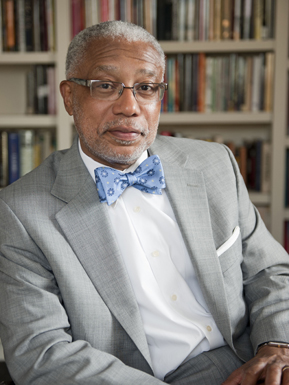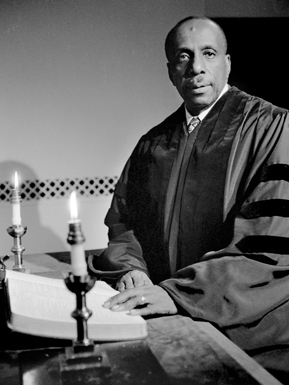MLK’s Mentor Revealed
Second volume of papers traces Howard Thurman’s thinking pre-BU

He criticized Christianity for its racial segregation, the New Deal for being half-hearted, and America for mimicking, in its Jim Crow laws, the fascistic tendencies of Europe’s real fascists. Having already labeled Jesus’ virgin birth a myth, albeit a religiously instructive one, he was no stranger to hot-button commentary.
Howard Thurman (Hon.’67) (pictured below) expressed these thoughts privately, and sometimes publicly, in the years before he became BU’s pioneering African American chapel dean and mentored a young Martin Luther King, Jr. (GRS’55, Hon.’59). The Papers of Howard Washington Thurman, Volume 2: Christian, Who Calls Me Christian? (University of South Carolina Press), out this month, features a fraction of his surviving 58,000 papers. The book spans the years from 1936, just after Thurman’s life-altering meeting with Gandhi, to 1943, just before his cofounding the country’s first integrated, interfaith church in San Francisco.
Though the period preceded his arrival at BU as Marsh Chapel dean in 1953—he was the first black dean at a mostly white American campus—some papers anticipate his dozen years here, says the volume’s senior editor, Walter Fluker (GRS’88), the Martin Luther King, Jr., Professor of Ethical Leadership at the School of Theology. Fluker, BU’s resident Thurman expert, plans to publish another volume next year and a fourth in 2013.
In the new book, “Thurman doesn’t do a lot of changing,” says Fluker. “He deepens. Religion for Thurman is functional, it’s pragmatic. His basic question is, what does religion have to say to those whose back is against the wall—not whether religion is going to save me and I go to eternity when I die. Those are not his questions at all.”
Fluker began working on the four-volume project in the early 1990s. He says Thurman’s voluminous correspondence reflected the clout of a man before whom the Reverend Jesse Jackson would sit on the floor as a sign of deference. Fluker spoke with BU Today about the book.

BU Today: How much of this material has never been published before?
Fluker: At least 60 percent, 70 percent. Several documents speak to Thurman’s lectures, which were the fodder for Jesus and the Disinherited, his most popular book, published in 1949. He looks at theological warrants for what Jesus did: salvation, temptation, all the way through to resurrection. This is quite a find for us. Also, we have lectures, excerpted and quoted in a number of places that refer to mysticism and social action.
Where did you find this material?
We have worked with over 14 repositories, including one in South Africa. BU has close to 90 percent of the papers of Howard Thurman—all of those that his late wife, Sue Bailey Thurman, released. She was discreet, and so was Howard. Howard Thurman, before his death, went into the garage, according to Sue Bailey Thurman, and took a lot of the private correspondence and burned it.
He was a scholar; he knew that history would be interested in his correspondence.
His pledge to confidentiality—he was also a pastor—I think overruled.
What’s most important about the correspondence in this volume?
This volume begins after his return from India, where he has experienced this vision of community at Khyber Pass (today, on the Pakistan-Afghanistan border). He sees the camels going through Khyber Pass, bringing trade to other places; the vision is one of difference but also unity. He was very critical of religious dogma and practices that abetted segregation, but also interested in interfaith dialogue, the fact that the church was the most segregated institution in American society.
That’s quite a statement. The schools were segregated; this was years before Truman desegregated the military.
But the church, Thurman says, bears a certain moral responsibility to embody, in its own life and practices, this idea of community. He’s kind of ahead of his time. He’s a rationalist and, at the same time, a mystic.
What did he say about the Depression?
He has a kind of a socialist bent. He’s not a communist, but he’s not afraid of the Red rhetoric. He sides with future Nobel laureate Ralph Bunche, who basically was arguing that the New Deal was not as far-reaching as it ought to be and certainly had not addressed the issues around race.
Does he say anything about the war?
He’s a pacifist. But he makes a decision to support especially the black soldiers who are fighting for the country. He makes a case that the “fascist masquerade,” which is one of his essays—that’s volume 3—is not just in Germany and across the sea; it’s also here. He ties it in with the plight of African Americans and other poor classes.
It’s during this period, too, that he begins correspondence with Daniel Marsh, then BU’s president and the namesake for Marsh Chapel. Thurman delivers lectures at BU in the late ’30s. So Thurman is already beginning the Boston University conversation.

Comments & Discussion
Boston University moderates comments to facilitate an informed, substantive, civil conversation. Abusive, profane, self-promotional, misleading, incoherent or off-topic comments will be rejected. Moderators are staffed during regular business hours (EST) and can only accept comments written in English. Statistics or facts must include a citation or a link to the citation.